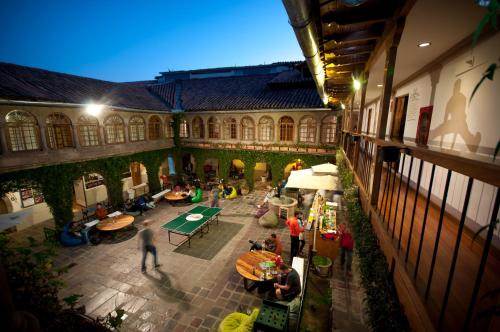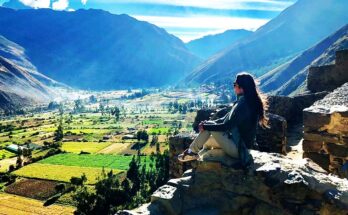When I first traveled to Peru, I felt this overwhelming desire to help. I wanted to give back to the people who had been so generous to me. In fact, I founded Llama Expeditions as a means to give back.
Below are 10 lessons I’ve learned about giving so that my efforts really make a difference.
1. Ask. Don’t assume that you know what people need or want. I heard a story when I was hiking with llamas in the Lares Valley. About a month before, a trekker had given his fleece jacket to one of the local children along the trail. He thought the child, dressed in his traditional clothing, looked cold. The child’s parents were offended. They saw the gift as a slight, as if the trekker was implying that the traditional clothing in which they had dressed their child was inadequate.
2. Patronize businesses that help. We make it a habit to patronize Heart’s Cafe in Ollantaytambo. Living Heart is a non-profit organization that provides services to impoverished people living in the Andes. They have projects focused on helping with nutrition, education, health and sustainable agriculture. The profits from the Cafe go to helping fund the projects. You could also check out Pack for a Purpose. Drop off the school or personal hygiene supplies you pack at a participating hotel. We place our travelers at two hotels in Peru that work with Pack for a Purpose – Posada Amazonas and Hotel Antigua Miraflores.
3. Support local businesses. This could mean choosing locally owned hotels over international chains and eating in locally owned restaurants. This helps improve the standard of living for the local people as your money stays within the community, doing good for the community. Even better, participate in community tourism by doing a home stay. This benefits local communities directly and it makes for an unforgettable vacation experience as you fully immerse yourself in a different culture.
4. Buy handicrafts instead of handing out money. This cultivates a culture of entrepreneurship instead of a culture of begging. Sometimes buying handicrafts from children can be touchy. In some countries, if you buy handicrafts from children, you are encouraging their parents to keep them out of school. In other countries, school is not an option. So, buying handicrafts from children can help put food on the family table. If you are not sure, ask a local.
5. Do your research. Make sure that the non-profit you want to support is in the business of empowering the communities with which they work instead of doing it for them. We work with the Center of Traditional Textiles of Cusco. They help communities in the Andes maintain and pass on their weaving traditions. The Center helps these communities to form cooperatives. They teach cooperative members about marketing and finance so in the end the community has a viable weaving business.
6. Consider volunteering but carefully vet the organization first. Make sure the organization you volunteer with has a lasting positive impact on the community. Doctors Without Borders is a good example. If you are going to be reading to orphans or building a school, consider the long-term impact. What is the impact to those orphans of having so many people pass through their lives? Are you taking away a local job by building a school that locals could build? If you are considering voluntourism, read the Conde Naste article to learn about the possible unintended consequences of volunteering.
7. Give goods instead of cash. Unless you are donating directly to a reputable non-profit, it is often better to give goods instead of cash. Toothbrushes, notebooks, pens, books in good condition can all be meaningful contributions. Cash can too easily disappear.
8. Don’t think you have to give a lot to make a difference. Depending on the country, you can spend $25 or $50 for supplies or equipment to make a real difference to a school or a clinic. Every drop in the bucket adds up.
9. Prove your intentions are pure. If your itinerary involves spending time with local children for any length of time, expect to go through a background check. You might be a good person, but not everyone has an agenda that is so pure. Responsible tour operators will ask you to submit a background check for the protection of the children.
10. Go on a philanthropic tour. The advantage is that the tour operator has done all the legwork for you and will incorporate many if not all of the suggestions above.



